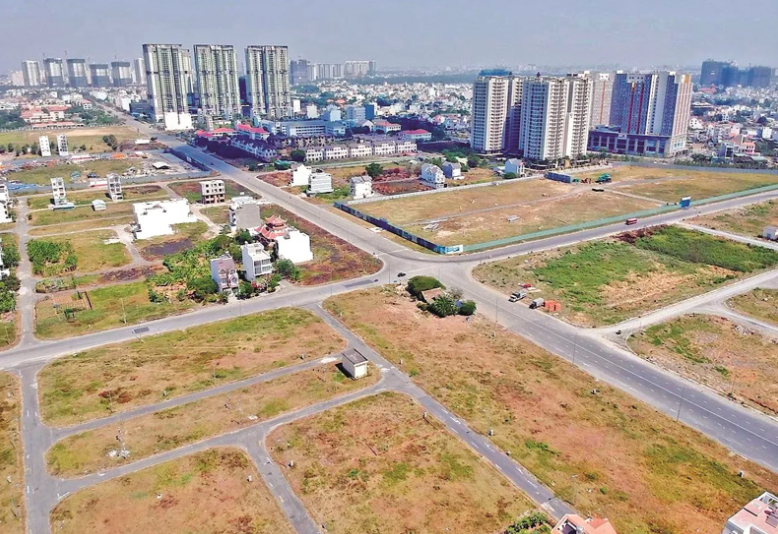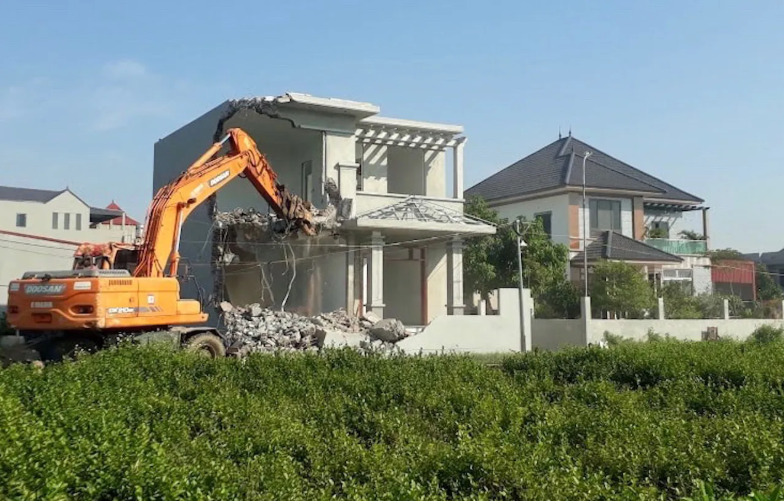Hanoi tightens enforcement against land-use breaches
Hanoi's decision to double the administrative fines compared to the central government rates shows the proactive and strategic approach of a special municipality dealing with the dual pressures of development and land conservation.
THE HANOI TIMES — Amid ongoing challenges in land management, particularly in rural and suburban areas, Hanoi has issued a resolution introducing new fines for certain land use offenses.

Land under development in Hanoi's suburbs. Photo: Pham Hung/The Hanoi Times
The resolution adopted by the Hanoi People's Council on April 29 will take effect on September 1.
Addressing ongoing issues
Land use violations, particularly those involving agricultural and public land, have become more complex and widespread, overheating real estate market in many areas and fueling illegal activities such as unauthorized changes in agricultural land use, construction without permits, land degradation, and encroachment on public ponds and rice fields.
Misuse of government-assigned or leased land has also been a recurring issue. Many organizations use land for purposes other than those intended, fail to complete land registration procedures, or illegally sublease land or factory space. These actions have undermined land management at various levels of government.
The lack of sufficiently deterrent sanctions encourages violators to act with impunity. This has made the adoption of stronger enforcement tools imperative.
According to Nguyen Xuan Dai, Director of Hanoi's Department of Agriculture and Environment, the city is under increasing pressure from infrastructure development and rapid urbanization. "Tighter land management is essential to ensure efficient land use, support socio-economic development projects, and improve the quality of life."
Recognizing the urgency of stricter land management, Hanoi expedited the drafting of this resolution well ahead of schedule. The department gathered feedback and submitted the draft resolution for approval at the council's special session in late April.
The resolution doubles the fines for 71 land use violations according to the penalty framework of Articles 8 to 29 of Decree No. 123/2024/ND-CP, issued on October 4, 2024.
He also emphasized that increasing penalties is a necessary step to restore order, especially in peri-urban areas and areas under intense urban development pressure, where land values are high and corruption is rife.

A structure violating land use in Soc Son District is being penalized. Photo: Nguyen Tung/The Hanoi Times
Breakthroughs for growth
This resolution introduces a robust legal instrument tailored to the reality of Hanoi, where urbanization is rapid, demand for land is high, and land values are the highest in the country.
It reflects the city's bold institutional and policy response, underscoring its strong commitment to disciplined, effective governance and the creation of a modern, civilized urban environment, according to local authorities.
Nguyen Trong Vinh, Vice Chairman of the Phu Xuyen District People's Committee, said that the resolution's strict penalties, well-defined implementation mechanisms, and assigned responsibilities make it a practical extension of the 2024 Land Law.
"The resolution is not only a sanctioning tool, but also a legal basis that empowers departments and localities in monitoring and enforcing land use. This creates a platform for more transparent land management in line with approved land use plans and strengthens accountability at the grassroots level," said Vinh.
The adoption of the resolution and the city People's Committee's close supervision of its implementation have activated many district governments, which have moved from passive monitoring to active enforcement.
Bui Van Sang, Chairman of the Thanh Oai District People's Committee, said the district has immediately instructed local authorities to address all existing and new violations. All infractions must be dealt with thoroughly and without exception.
"The clearly defined and strict penalty framework has made enforcement more effective and created a strong deterrent effect," he noted.
In April and early May alone, Thanh Oai closed 74 enforcement cases and imposed hundreds of millions of VND in fines, an encouraging sign of restored order at the local level.
In Quoc Oai District, authorities in communes such as Hoa Thach, Tuyet Nghia, and Dong Xuan carried out coordinated enforcement actions to demolish illegal structures on agricultural land, some of which were longstanding and complex. Deputy Chairman Pham Quang Tuan said the city's resolution provided an important legal basis and motivation for local authorities to act decisively.
The district's stance is to fully resolve violations, prevent new cases and avoid public frustration, he said.
In Me Linh District, a former hotspot for land use violations, authorities are racing to resolve outstanding cases. The district has categorized violations, assigned targets to each commune, and set firm deadlines, making land use violations a key policy task for 2025. Meanwhile, in Hoai Duc District, Dong La Commune has already resolved 63 new farmland violations and taken a firm stance against shielding or tolerating illegal activities.
These developments show that the resolution is more than just words on paper, it is actively implemented, reawakening local government accountability and restoring public confidence in the rule of law. The resolution will serve as a key benchmark for evaluating the performance of local leaders and will promote effective land governance.












